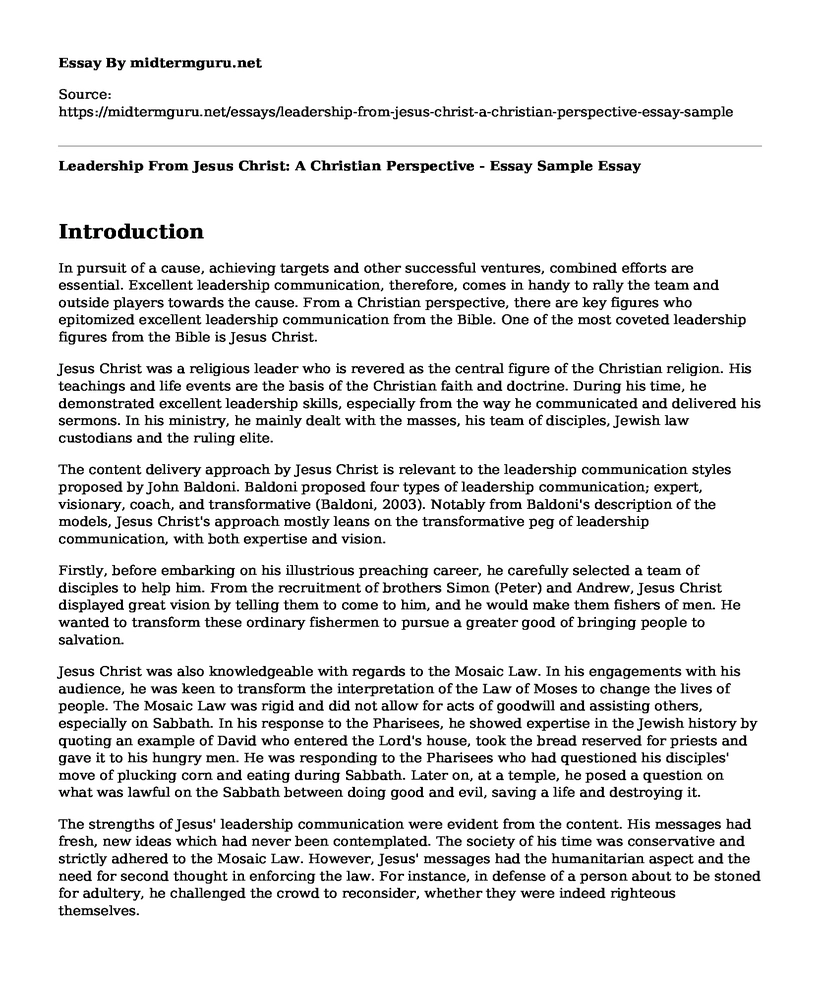Introduction
In pursuit of a cause, achieving targets and other successful ventures, combined efforts are essential. Excellent leadership communication, therefore, comes in handy to rally the team and outside players towards the cause. From a Christian perspective, there are key figures who epitomized excellent leadership communication from the Bible. One of the most coveted leadership figures from the Bible is Jesus Christ.
Jesus Christ was a religious leader who is revered as the central figure of the Christian religion. His teachings and life events are the basis of the Christian faith and doctrine. During his time, he demonstrated excellent leadership skills, especially from the way he communicated and delivered his sermons. In his ministry, he mainly dealt with the masses, his team of disciples, Jewish law custodians and the ruling elite.
The content delivery approach by Jesus Christ is relevant to the leadership communication styles proposed by John Baldoni. Baldoni proposed four types of leadership communication; expert, visionary, coach, and transformative (Baldoni, 2003). Notably from Baldoni's description of the models, Jesus Christ's approach mostly leans on the transformative peg of leadership communication, with both expertise and vision.
Firstly, before embarking on his illustrious preaching career, he carefully selected a team of disciples to help him. From the recruitment of brothers Simon (Peter) and Andrew, Jesus Christ displayed great vision by telling them to come to him, and he would make them fishers of men. He wanted to transform these ordinary fishermen to pursue a greater good of bringing people to salvation.
Jesus Christ was also knowledgeable with regards to the Mosaic Law. In his engagements with his audience, he was keen to transform the interpretation of the Law of Moses to change the lives of people. The Mosaic Law was rigid and did not allow for acts of goodwill and assisting others, especially on Sabbath. In his response to the Pharisees, he showed expertise in the Jewish history by quoting an example of David who entered the Lord's house, took the bread reserved for priests and gave it to his hungry men. He was responding to the Pharisees who had questioned his disciples' move of plucking corn and eating during Sabbath. Later on, at a temple, he posed a question on what was lawful on the Sabbath between doing good and evil, saving a life and destroying it.
The strengths of Jesus' leadership communication were evident from the content. His messages had fresh, new ideas which had never been contemplated. The society of his time was conservative and strictly adhered to the Mosaic Law. However, Jesus' messages had the humanitarian aspect and the need for second thought in enforcing the law. For instance, in defense of a person about to be stoned for adultery, he challenged the crowd to reconsider, whether they were indeed righteous themselves.
The delivery of the messages by Jesus Christ was top notch. Jesus Christ used parables in communicating with all his audiences; whether disciples, masses, or Pharisees. These were real-life descriptions of the people which featured the daily activities. The people identified and easily related to them.
Jesus also used questions, mainly rhetorical to pass out sensitive issues which needed intensive thought. In his contribution, especially to the subject of fairness, he used questions to get his audience to reflect on their deeds to others.
The outcome of Jesus Christ's communication strategies was that he was able to derive spiritual truths in the daily experiences of the people. By linking rather complicated religious bits with daily activities, people understood him better and adjusted accordingly.
The questions posed by Jesus prompted moments of soul searching and intense reflection of his messages by the audience. The ultimate result of the observations was the change of stands about various issues, a conviction to follow the way of the Lord and repenting.
As a leader, regular communication is vital towards rallying the team and audience in a particular direction. It is crucial for them to sense the inner conviction of the leader as they receive messages. That personal belief brings the vision that is communicated out, and it influences the chances of whether or not the audience gets convinced.
References
Baldoni, J. (2003). Great Communication Secrets of Great Leaders. New York: McGraw Hill Professional.
Cite this page
Leadership From Jesus Christ: A Christian Perspective - Essay Sample. (2023, Jan 25). Retrieved from https://midtermguru.com/essays/leadership-from-jesus-christ-a-christian-perspective-essay-sample
If you are the original author of this essay and no longer wish to have it published on the midtermguru.com website, please click below to request its removal:
- Duccio di Buoninsegna: The Nativity with the Prophets Isaiah and Ezekiel Painting
- Business Ethics Reflection Paper
- Planning and Allocation of Work - Paper Example
- Paper Example on Deconstructing Relational Developmental Theory
- Analysis of an AMREF Case Study
- Essay Sample on Business Management: Law and Strategy Concept
- Reflective Paper Example on Teamwork







